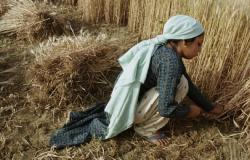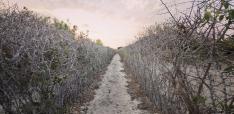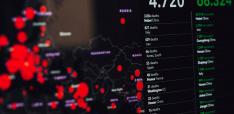Women’s Equality will not come after the Environmental Revolution

Climate and environmental impacts are ravaging our planet, and women and marginalized groups are among those most affected.
“We must resist in the different ways that we can and we must do it together, (as) our struggle is vast and intertwined.”
- Jill Mangaliman, Got Green
We live in a world where global climate change is occurring at a much faster rate than previously predicted. No longer a threat in the distant future, its impacts are already causing devastation to people and ecosystems around the world, leading to 400,000 annual deaths, and an unpredictably changed future for us all.
We also live in a world where one in three women will experience physical and/or sexual violence, mostly by an intimate partner; where 70% of trafficking victims are women or girls; where two-thirds of people who are illiterate are women; and where despite being 50% of the global population, around one in five parliamentarians are women.
In such a world, what do we deem more important: the dangerously high levels of greenhouse gases in the atmosphere, or overcoming systemic social inequality? The rights of future generations to a safe planet, or the rights of women to live free of violence and oppression? Both - or perhaps neither?
As Audre Lorde stated, we do not live single-issue lives.
These questions are what some -many- of us call a false dichotomy. Pitting environmental concerns against social demands creates a binary where one can be tackled, whilst the other ignored - where we believe we must choose between one and the other.
But why are we reaching our planetary limits in the first place? Where does environmental degradation often take place, and whom does it impact the most? who is responsible for these negative effects? And what are the most effective and lasting “solutions” to these crises?
I have found the clearest answers to these questions in the stories and lived experiences of those who already live the climate and environmental crisis – those who know well, and have to survive in the midst of, the fossil fuel and extractive industries that generate the vast majority of carbon emissions and environmental degradation today.
In the context of global inequalities emerging from the current neoliberal macroeconomic policies, it is not a coincidence that many of those standing up to these industries and denouncing corporate power, defending their livelihoods, the rights of communities and families, caring for themselves and others in the face of nutrition, health and social impacts, and experiencing disproportionate vulnerability and violence in these contexts, are women.
This is what climate change and environmental degradation looks like.
Melina Laboucan-Massimo lives in Little Buffalo in the Peace River region in northern Canada. She is Lubicon Cree, and her homelands are in the midst of the Alberta tar sands. As she recently shared at the World Social Forum, Alberta is a place where the fossil fuel industry converts pristine delta water into lakes of toxic waste so vast that they can be seen from outer space; tears down the Boreal forest –a crucial carbon sink- at rates that surpass deforestation in the Amazon; spills thousands of barrels of oil that it doesn’t adequately remediate; and generates cancer clusters, forcing people to breathe in hydrogen sulphide among other toxins. As she narrates, the situation in her homelands is an expression of the “sacrifice zone” mentality. And it is in this same context of rapacious extractivism that there are over 1200 missing and murdered indigenous women, and over 4,000 cases still not properly documented.
In a sacrifice zone, a particular people and place are expendable “for the sake” of life and profit elsewhere. That is, the lives of some are worth more than the lives of others. In this context, is it a coincidence that indigenous women are disappearing as indigenous lands are being decimated?
Can racial, ethnic and gender-based inequality be separated from what drives environmental devastation in the Alberta tar sands? Or to put it differently – could one exist without the other?
Can we understand the environmental crisis without talking about violence?
In Peru, we have the third highest rate of femicide in South America, the second highest rate of rape reported, and a shocking seven in ten women have been victims of sexual, physical, verbal or psychological violence. We are currently living a powerful historic moment of social change, as after two high-profile cases of women who were almost killed by their male partners, and whose aggressors were given light, suspended sentences, close to half a million people took to the streets on the 13th of August in the capital city of Lima, and thousands more around the country, to say “Ni Una Menos!” (Not One Less).
Within this uphill battle against deep-rooted violence and sexism, another form of violence also characterizes our context: we are the fourth most dangerous country in which to be an environmental defender.
Those who take on the struggle of defending our forests, waterways and territories face repression, threats and ultimately death at the hands of those hired by extractivist industries. And women environmental defenders, at the intersection of these forms of violence, face particular forms of repression.
In Peru and in the broader Latin American context, this includes violence from their own communities and families, in retaliation for stepping outside of their ascribed roles. As Patricia Ardon of JASS Meso America shared in an online exchange facilitated by AWID and WEDO earlier this year, it can also take the shape of discrediting and spreading rumors about women environmental defenders, who according to mainstream media outlets “should be in their homes”.
Can we address environment concerns without also addressing the violence against those who call for its protection - including violence against women?
Can we de-link women’s struggles for safety and freedom from struggles for our water, lands and forests?
Change starts from the home.
Other stories shared during the online exchange spoke of the gendered division of labor, due to which women are traditionally in charge of care and domestic work. Climate variability and pollution are critical obstacles to the safe realization of this work. Particularly in rural areas, following a natural disaster, resources such as water and fodder become scarce or unreliable, and the family’s health is affected - both of which increase women’s workload.
Is it possible to effectively adapt to climate change without considering the work that women are already doing to care for their communities, and the knowledge that they have?
Longer journeys to collect water and fodder can also mean increased safety risks for women, in addition to the risks entailed by the natural disasters themselves. As Adi Vasulevu of FemLINKPACIFIC in Fiji shared, the recent Tropical Cyclone Winston led to 44 deaths, of which the majority were women - and cases of rape have been reported at evacuation centers, and trauma and illness is high.
Is it possible to paint a complete picture of climate impacts, without mentioning the increased sexual abuse and risks women are facing?
In urban areas, women also face particular impacts. As Araceli from Domésticas Unidas shared at the World Social Forum, women hired to clean houses are exposed to toxic, petrol-based cleaning products. She has seen most of her fellow domestic workers fall sick, and a disproportionate number of them die from cancer. In the face of this, she took it upon herself to find out about and make her own safe and sustainable cleaning liquids, and shares the recipes freely with the women around her.
Can climate and environmental “solutions” be adequate to everyone’s needs without taking into account women’s particular experiences and knowledge?
Telling the complete story: climate and inequality are two sides of the same coin.
These are just a few among countless stories that speak to what climate change and environmental degradation means on the ground. They show us what climate and environmental impacts look like, beyond parts per million and carbon budgets. They are testament to how the fossil fuel industry operates and to the rapacious nature of the current industrial system.
They bring economic, social, cultural and political elements to the climate narrative, making connections to social inequality, gender roles, and policies of economic globalization and prevalence of corporate power over environmental regulation.
Perhaps most importantly, they also show us how people are challenging and responding to the crisis, offering new narratives of human rights and adopting valuable propositions seeking to achieve broader political, social, economic and cultural transformations for us all. Upholding the false binary between climate and social inequality means upholding the social conditions that marginalize these voices and perspectives, denying us their deep insights, answers and powerful ability to inspire and transform.
As Naomi Klein states, “saying climate is “more important” is how we lose.” Asking people to choose between poverty and pollution weakens and divides our movements.
But not only that – it ignores the lived realities of millions around the world for whom environment cannot be separated from inequality, lest their story be told incomplete.
Women, feminists, social justice and environmental justice advocates around the world are making these connections, and engaging in work that centers the intersections between environmental and social struggles. From indigenous celebration of renewable energy in Alberta, to feminists in Bolivia connecting fights for our body’s freedom to the liberation of our territories from extractivism, to labor unions advocating for a just transition from the climate crisis, there are countless examples of cross-movement dialogue, solidarity and action to draw from.
Majandra Rodriguez Acha will be speaking at the International AWID Forum which opens this week 8-11 in Bahia, Brazil Feminist Futures: Building Collective Power for Rights and Justice, openDemocracy 50.50 will be reporting daily from the Forum. Information about all of FRIDA's sessions at the AWID Forum are here.
Majandra Rodriguez Acha is currently Young Feminist Fellow for Climate Justice at the Women’s Environment and Development Organization (WEDO) and FRIDA: The Young Feminist Fund. She is a founding member of TierrActiva Peru, a Peruvian youth collective for system change, not climate change, and a board member of the Next Generation Climate Board at Global Greengrants Fund. This post first appeared on OpenDemocracy's 50.50 Inclusive Democracy.
Photo credit: World Bank Photo Collection via Foter.com / CC BY-NC-ND


